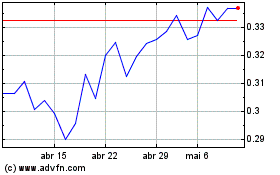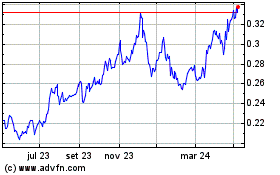Europe Bank Shares Up On New Rules, Though Payouts Seen At Risk
13 Setembro 2010 - 6:28AM
Dow Jones News
European bank shares rose Monday after regulators laid out
tougher bank-capital requirements that analysts said helped end
uncertainty but which are ultimately seen meaning higher costs for
banking customers and lower returns for shareholders.
The Basel Committee on Banking Supervision on Sunday said banks
from 2013 must hold a minimum common equity of at least 7% of their
risk-weighted assets and lift their total capital on hand to 10.5%.
The rules were broadly in line with expectations, and banks have
several years to fully implement them.
Analysts said the vast majority of Europe's banks are in good
enough shape to comply with the rules, with U.K. and Swiss banks
particularly well positioned since their equity ratios are already
among the highest in Europe. Many European banks have been hoarding
cash in anticipation of the higher capital requirements, raising
the ire of politicians who want them to lend more to businesses and
help jumpstart sluggish economic growth.
"We do not think there is a quoted bank in Europe that would be
unable to meet these targets," UBS bank analysts said, calling the
implementation timeline that runs from 2013 to 2019 "surprisingly
accommodative."
The U.K.'s Lloyds Banking Group PLC (LYG) and Royal Bank of
Scotland Group PLC (RBS) were among the lead gainers, with both
banks' shares up 2.8% and 2.3%, respectively, at 0840 GMT.
Switzerland's UBS AG rose 1% and Credit Suisse Group gained 1.9%,
while the Euro Stoxx banks index was up 1.8%.
Credit Suisse analysts said the clarity around the rules means
investors can now focus on which banks might have extra capital to
return to shareholders, and identified BNP Paribas SA (BNP.FR),
Lloyds Banking Group and Svenska Handelsbanken (SHB-B.SK) as
"fundamentally attractive stocks with clear surpluses as soon as
2012."
BNP Paribas shares rose 1.8% and Svenska Handelsbanken was up
2.8%.
U.K. banking analysts at Bank of America Merrill Lynch said the
rules marked a "very large milestone for the sector," supporting
its positive stance on U.K. banks. In addition to Lloyds, it said
RBS should also have significant surplus capital by 2012 that could
benefit shareholders.
However, analyst agreed that the broader implications of the
rules are an overall reduction in dividend payouts, since banks
typically will have to hold onto more of their retained earnings to
meet the requirements.
For example, banks won't necessarily be obliged to hold a new
"conservation buffer" of up to 2.5%, but they will then face
increasing constraints on their ability to distribute capital in
the form of dividends or bonuses, analysts at CreditSights
said.
Banking customers could also be losers from the new rules,
Angela Knight, chief executive officer of the British Bankers'
Association warned, saying the "cheap money era is over."
"All the changes are good from a stability perspective but add
billions to the fixed operating cost of a bank. The consequence is
that inevitably the cost of credit--the price the borrower pays for
money--will rise," she said.
There were also several banks singled out by analysts as likely
requiring more capital, including Portugal's Banco Espirito Santo
(BES.LB) and Banco Comercial Portugues (BCP.LB), and Italy's Banca
Monte dei Paschi di Siena (BMPS.MI).
Those banks' share prices were also higher Monday, though, as
investors counted on the banks having plenty of time to firm up
their finances.
Meanwhile, Germany's largest bank, Deutsche Bank AG (DB), on
Sunday said it is raising EUR9.8 billion in capital to buy a
majority stake in Deutsche Postbank AG (DPB.XE), as well as to
boost its capital to comply with the rules.
-By Margot Patrick, Dow Jones Newswires; +44 (0)20 7842 9451;
margot.patrick@dowjones.com
(Katharina Bart in Zurich contributed to this article.)
Banco Comercial Portugues (EU:BCP)
Gráfico Histórico do Ativo
De Jun 2024 até Jul 2024

Banco Comercial Portugues (EU:BCP)
Gráfico Histórico do Ativo
De Jul 2023 até Jul 2024
